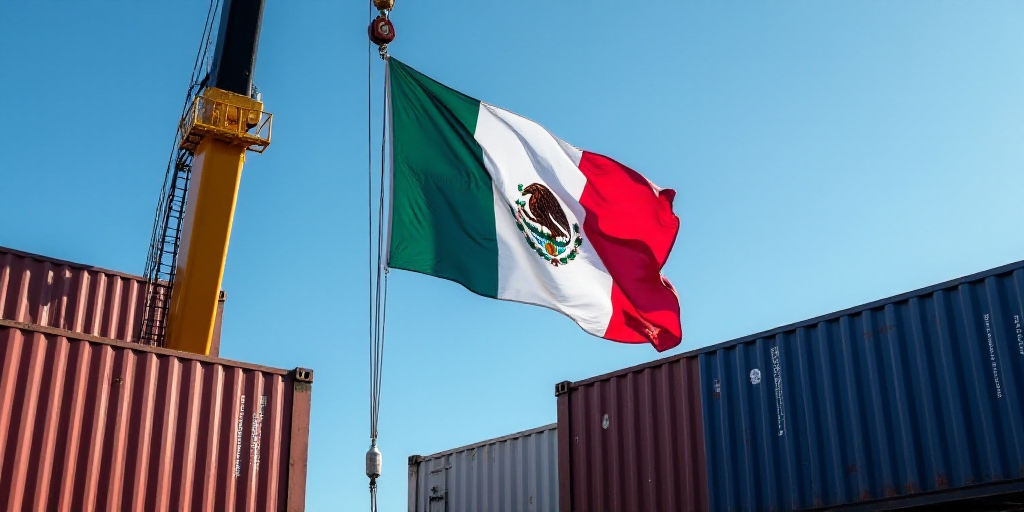The Significance of the Northeast Region in Mexican Exports
The northeastern region of Mexico is pivotal for the country’s export dynamism, accounting for 44% of Mexico’s total external sales valued at over $240 billion. This region includes Chihuahua (14%), Coahuila (12%), Nuevo León (10%), Tamaulipas (7%), and Durango (1%). Nuevo León, however, attracts the most foreign direct investment.
Potential Risks Ahead of T-MEC Review
With uncertainty and a politically charged environment in the United States, particularly regarding tariffs, there’s a risk that automotive sector rules of origin could become stricter. Currently, regional content value is around 70%, but it might rise to 85% of the vehicle’s value, requiring components to originate from the region to avoid tariffs when exporting to the U.S.
Preparing for a Broader Review or Renegotiation
Should the planned 2026 review turn into a broader renegotiation, Mexico must strategize without improvisation. Key areas like artificial intelligence and semiconductors, currently led by Taiwan (though the U.S. is developing chips in Arizona), need critical supply chains to prevent disruptions.
This stance safeguards millions of jobs and North American competitiveness, as 38% of formal employment in Mexico relates directly or indirectly to the T-MEC, according to the Secretariat of Economy.
The Crucial Role of IMMEX Companies
Companies under the Industria Manufacturera, Maquiladora y de Servicios de Exportación (IMMEX) program are vital in the upcoming T-MEC review or renegotiation.
With 6,551 registered entities in May (5,234 manufacturing, 1,317 non-manufacturing), IMMEX generated over 3.2 million jobs (90% in manufacturing) and reported $691,123 million in revenue, primarily from manufacturing activities.
Employment concentrated in Nuevo León (12.7%), Chihuahua (12.3%), Baja California (12%), Coahuila (8.6%), and Tamaulipas (7.6%). Nuevo León alone hosts 724 IMMEX establishments generating over 383,000 direct jobs (20% of the state’s labor force).
Strengthening Logistics and Fiscal Processes
Index Nuevo León’s Zelina Fernández, General Director, emphasized the industry’s need to act amidst significant changes, as it’s essential for Nuevo León’s economic development.
Luis Cázares, Index Nuevo León’s Comité de Comercio Exterior member, noted the urgency to implement T-MEC changes and stay updated. He highlighted the Foro IMMEX 2025, addressing customs compliance, best practices, and supply chain strengthening strategies.
Currently, only 31% of components are produced in Mexico, necessitating relocation of inputs to meet the rules of origin, Cázares pointed out.
He also mentioned that 68% of Index’s associated companies are advancing local sourcing development programs, increasing regional content.
Logistics challenges persist, with Mexico ranking 66th in logistics performance and 84th in customs efficiency, per World Bank data. This increases export times and costs, making infrastructure and customs improvement crucial for more competitive value chains.
Fiscal and Financial Perspective Analysis
Aldo Francisco Arévalo, Index Nuevo León’s Fiscal-Finance Committee Director, explained that maquiladoras are key as they account for 38% of reviewed import value in 2023.
This compels companies to bolster compliance processes, maintain constant updates, and hold certifications like VAT and Authorized Economic Operator.
These topics, along with IVA refund changes, state subsidies, and fiscal policy, will be discussed at the Foro IMMEX 2025 with experts from SAT and international firms.
Arévalo revealed that the Servicio de Administración Tributaria (SAT) is crafting a Master Plan to streamline regulatory compliance and boost revenue.






